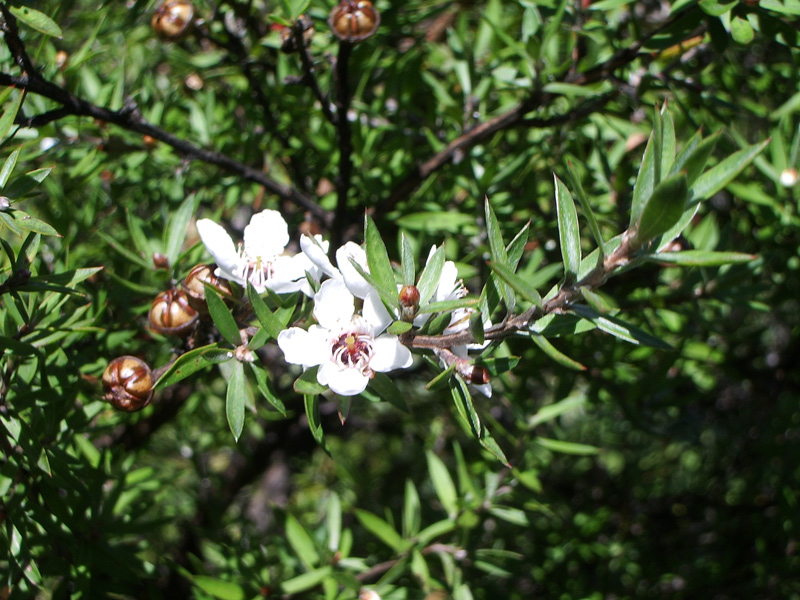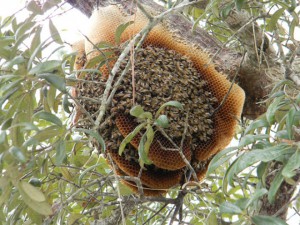
Just the name “Manuka honey” makes me feel healthy.
“Manuka, honey, would you be my nurse today?”
Okay – what the heck is “Manuka?” It’s a flowering shrub from New Zealand. Leptospermum scoparium, to be precise.
There are varieties of Leptospermum grown as landscape plants and other members of the genus are antibacterial, yet L. scoparium in particular has now been reported as a nectar source for bees which then in turn produce honey with the capability of wiping out so-called “superbugs”.
Via Natural News:
 (NaturalNews) Not all honey is created equal. While the benefits of raw, unprocessed honey have been well-documented over the centuries, Australian researchers have found one type of honey, called Manuka honey, to be better than all known antibiotics.
(NaturalNews) Not all honey is created equal. While the benefits of raw, unprocessed honey have been well-documented over the centuries, Australian researchers have found one type of honey, called Manuka honey, to be better than all known antibiotics.
Manuka honey is produced by bees that forage on the nectar of Leptospermum Scoparium, or New Zealand’s Manuka bush, as well as tea trees, native to Australia and New Zealand only.
This remarkable type of honey not only effectively kills bacteria, but none of the bugs killed by it have been able to build up immunity. In a world where many of the last resort antibiotics are failing against antibiotic-resistant superbugs, Manuka honey may hold the key to fighting resistance issues, saving thousands of lives worldwide.
Manuka honey fights superbugs
Dr. Dee Carter from the University of Sydney’s School of Molecular and Microbial Biosciences noted that antibiotics not only have short shelf lives, but the bacteria they attack quickly become resistant as well, making them useless over time.
The report, published in the European Journal of Clinical Microbiology and Infectious Diseases, claimed that Manuka honey killed almost every bacteria and pathogen it was tested on. Unlike all antibiotics available on today’s market, none of the bugs tested were able to survive the honey treatment.
According to Dr. Carter, there are particular compounds, like methylglyoxal, in the Manuka honey that cause multi-system failure in the bacteria, killing them before they are able to adapt and build up immunity.
Discoveries like these are why I believe strongly in the preservation of species and ecologies such as the rain forest.
We’ve barely scratched the surface on what is available in nature. Though I have no doubt the buzz on “manuka honey” will likely lead to some unscrupulous supplement sales, it may also inspire us to keep digging in nature for new cures for our ailments.
As for me, now I want to plant some manuka bushes. And get bees again! I had just gotten bees again some months before deciding to leave the US for greener shores.
Ah well. I can do it again.


5 comments
I was wondering if they have any varieties of Manuka that will thrive in Florida. The way they say it grows in New Zealand and the article with the bees made me think of the Brazilian pepper trees we have here. They grow all over the place in the pastures and the bees just go crazy over the flowers. Plus I’ve read that they have antibacterial and antifungal applications as well. Might be a similarly beneficial source of pollen for honey. I have to do more research and find out. For as far as we’ve come with science it is always interesting to find out how little we actually know and sad how much we’ve forgot and lost. Seems like nature has a way of showing us the answers if we allow her to teach us. Thanks for the education David. Merry Christmas to you and your family!
They do have varieties. I know Taylor Gardens Nursery in Sparr, Florida, had at least one variety of Leptosperumum, though it may not have been this specific species. If I still lived near there I would go scoop one up this week.
The Brazilian pepper is another reason why I don’t completely hate invasive plants. Yes, many are a pain in the neck… but most have their benefits, too. Just as a “chop and drop” biomass producing tree it’s cool. And the peppercorns can be used. And the bees like it.
Awesome David! Going to look into experimenting with it, or is your bucket list out of control?
Always out of control.
I actually have three books on my hard drive right now, unpublished.
That said, I would totally plant some of these if I could find them. I’ll have my eyes open. Gotta hunt down some of the local nurseries once I get my car back and get some land of my own.
Don’t take it wrong if I do a voodoo anti-mojo dance on you finding property down there. Your Florida native tribe needs you. Merry Christmas, BTW!
Comments are closed.